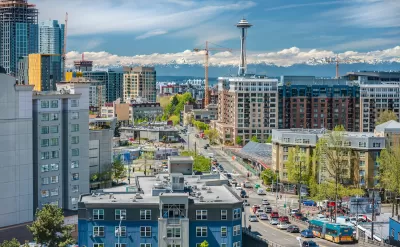Voters approved a corporate tax to fund the city’s housing authority despite an opposition campaign funded by Amazon and Microsoft.

In a recent Seattle ballot referendum, voters approved a measure to create a corporate tax to fund the city’s housing authority with 63 percent of the vote, reports Roshan Abraham in a Next City/Shelterforce article.
This in spite of an opposition effort funded by some of the city’s biggest corporations — a strategy that likely backfired. According to Tiffani McCoy of housing nonprofit House Our Neighbors, “We capitalized on the fact that Amazon and Microsoft were dumping in $100,000, and we made clear to voters that these corporations don’t want you to have social housing.”
The housing authority was approved by voters in 2023, but the February referendum created a crucial funding source. “The first question on the ballot asked if voters approved of funding the new authority using payroll taxes. Next, voters had to choose whether they wanted a new 5% payroll tax on individual compensation above $1,000,000, paid by companies, or to use an existing payroll tax that mostly funds affordable housing.”
Abraham explains how the housing authority will work to provide housing stability for low-income and fixed-income residents. “The authority will issue its own debt in the form of bonds and create a revolving loan fund, lending itself money for construction and acquisition that would be paid back through rents, with higher rents subsidizing lower rents.”
According to Abraham, “The win suggests a way forward for organizers on the local level to take the housing crisis into their own hands.”
FULL STORY: How Social Housing Won in Seattle, Despite a Flood of Big Tech Money

Planetizen Federal Action Tracker
A weekly monitor of how Trump’s orders and actions are impacting planners and planning in America.

Congressman Proposes Bill to Rename DC Metro “Trump Train”
The Make Autorail Great Again Act would withhold federal funding to the system until the Washington Metropolitan Area Transit Authority (WMATA), rebrands as the Washington Metropolitan Authority for Greater Access (WMAGA).

The Simple Legislative Tool Transforming Vacant Downtowns
In California, Michigan and Georgia, an easy win is bringing dollars — and delight — back to city centers.

The States Losing Rural Delivery Rooms at an Alarming Pace
In some states, as few as 9% of rural hospitals still deliver babies. As a result, rising pre-term births, no adequate pre-term care and harrowing close calls are a growing reality.

The Small South Asian Republic Going all in on EVs
Thanks to one simple policy change less than five years ago, 65% of new cars in this Himalayan country are now electric.

DC Backpedals on Bike Lane Protection, Swaps Barriers for Paint
Citing aesthetic concerns, the city is removing the concrete barriers and flexposts that once separated Arizona Avenue cyclists from motor vehicles.
Urban Design for Planners 1: Software Tools
This six-course series explores essential urban design concepts using open source software and equips planners with the tools they need to participate fully in the urban design process.
Planning for Universal Design
Learn the tools for implementing Universal Design in planning regulations.
Smith Gee Studio
City of Charlotte
City of Camden Redevelopment Agency
City of Astoria
Transportation Research & Education Center (TREC) at Portland State University
US High Speed Rail Association
City of Camden Redevelopment Agency
Municipality of Princeton (NJ)





























